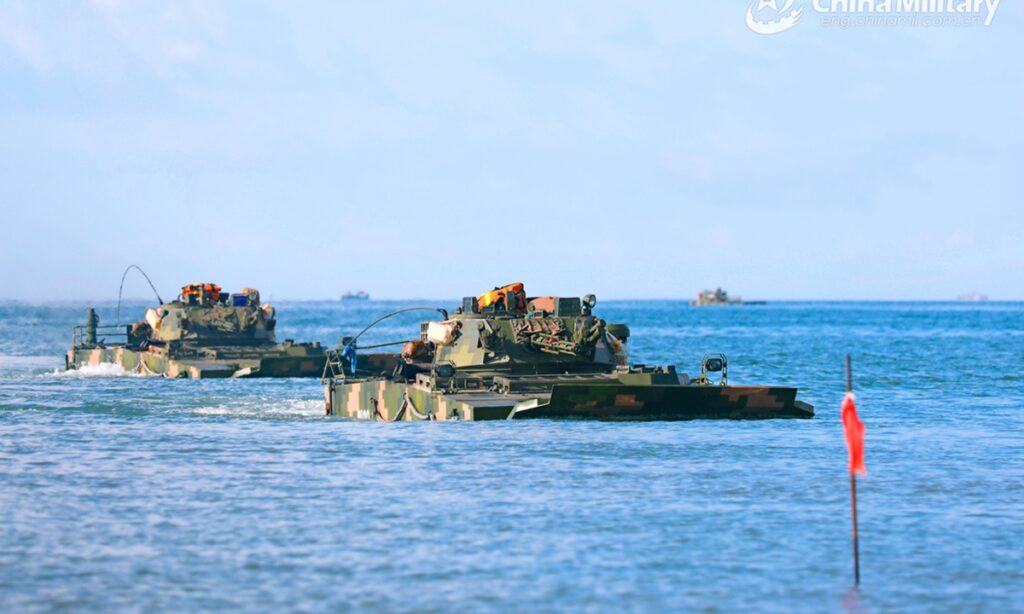Amphibious armored infantry fighting vehicles (IFV) attached to a brigade under the PLA 72nd Group Army drive into the waters during an amphibious training exercise focused on subjects of basic driving, landing craft ferrying and assault wave formation, etc. on May 21, 2021. Photo:China Military
According to Taiwan media outlets, the Democratic Progressive Party (DPP) authority is proposing a special budget totaling NT$200 billion ($7.14 billion) to “expedite the mass production of missiles with precision and long-range capabilities.” The situation in Afghanistan has strongly shaken the island. The DPP authority has recently repeatedly advocated that the island of Taiwan will strengthen its self-defense capacities and rely on itself for security, to show that they are different from the Afghan government which collapsed without resistance. The DPP authority has long wanted to promote the plan to upgrade its missiles. Now they have found an opportunity.
NT$200 billion is about 50 billion yuan, which is a huge figure for Taiwan island. This is equivalent to 54 percent of its annual military expenditure. However, it will only be a daydream if the DPP authority wishes to deter the Chinese mainland.
If Taiwan wants to produce those missiles and form combat effectiveness, it would take the island five to 10 years even if it advances the progress at a fast speed. Besides, the missiles need the support of systematic military capabilities, including the follow-up upgrade of intelligence capabilities and strategic deployment. Currently, Taiwan’s overall military system is defensive. When it forges an offensive deterrence, the only way would be a terroristic style, which will never win a strategic initiative for the island.
Taiwan is a very small island with no strategic depth at all. Its offensive missiles can be deployed in only a few bases. The denser those missiles are, the easier it is for the People’s Liberation Army (PLA) to destroy them in the first round of saturation attacks if a war breaks out. The PLA can increase the number of surface-to-surface missiles targeting Taiwan from multiple directions on a large scale, and pool the aerial bombing force that Taiwan cannot deal with. In the future, the PLA can also make full use of the unique attack advantages of the unmanned aerial vehicle system. We are fully capable of destroying Taiwan’s entire defense system immediately, and the Taiwan military’s combat power and will to resist will collapse rapidly at the same time.
The Chinese mainland will continue to pay close attention to military technology development in the Taiwan region. The war preparations on the island will pose no real threat to the mainland anyway, so let the Taiwan authorities waste their money. However, if Taiwan does have the preparation to threaten the mainland’s safety in an extremely aggressive way, the mainland must categorically request the authorities on the island to terminate their activities within a limited period and issue an ultimatum to them. If they refuse to stop their risky moves, the mainland could consider launching a surgical strike on them to destroy their ability to support such activities.
The mainland has neither given Taiwan such a similar warning nor carried out a multiple-point precision strike on the island before. But that doesn’t mean it will not do so in the future. If the DPP authority takes radical actions that tend to promote “Taiwan independence” or pose a serious threat to the security of the mainland, it will be time for the latter to enforce a policy of brinkmanship on Taiwan and force it to back off with ultimatums. If the authorities on the island still insist on going their own way, we will launch a surgical strike against them. We need to take that step when necessary, and that will be a language that the DPP authority can certainly understand.
We must send a clear signal to the DPP authority and various Taiwan secessionist forces on the island: They are now merely “caged birds” and “fish in the net” on China’s path toward reunification. Under no circumstance can they be swollen-headed. They must be careful not to cross the bottom line, and to prevent the worst-case scenario which could force the Chinese mainland to resort to force. This should be their No.1 political motto.
The Chinese mainland’s annual military spending is about $200 billion, and the primary focus of utilizing the budget is to ensure absolute strategic control over resolving the Taiwan question. How can Taiwan authorities’ little tricks possibly turn the tide? The NT$200 billion “deterrence plan” is ridiculous to the Chinese mainland. We could either completely despise it, or force the DPP authority to drop the idea with our resolution and capability when we feel some sort of substantial threat from it. When necessary, the PLA will take the initiative to purge the plan.
It should not be forgotten that the Chinese mainland possesses sufficient destructive capabilities against the military on the Taiwan island. Meanwhile, all the latter could do is causing a little harm, no more. The DPP authority can no longer threaten the Chinese mainland. The more troubles they stir up, the quicker they are heading toward their self-destruction.




